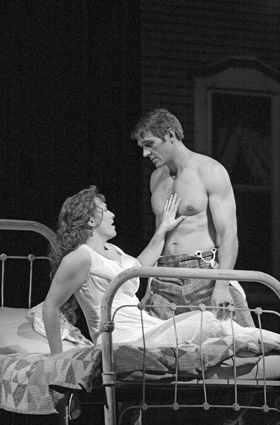Mediocre libretto, meandering score undermine Dreiser’s potent tale
It’s not like there’s anyone who wants new operas to fail. In fact, audiences, critics, and opera companies alike have huge stakes in seeing new works succeed. And goodness knows the Metropolitan Opera, like any reputable opera company, has a responsibility to present recent compositions. However, reviews are not for good intentions; I have to write about results. On that basis I have to say Tobias Picker’s “An American Tragedy” (seen December 8) is an expensive fizzle.
Maybe there is a way to extract an exciting libretto from Theodore Dreiser’s sprawling novel “An American Tragedy,” but librettist Gene Scheer didn’t find it. The text is talky without ever saying much, the language bland and pedestrian. An aria for protagonist Clyde Griffiths (Nathan Gunn) uses the image of a shiny new automobile as a symbol for his hunger for upward mobility in a rare moment of textual specificity. But otherwise Scheer’s libretto veers between banality and camp, as when capitalist Samuel Griffiths (Kim Begley) belts out the climactic lines of his entrance aria—“Concrete BLOCKS! Concrete BLOCKS! Concrete BLOCKS!”
Dreiser’s novel is set in the 1920s; the period of the opera was pushed back to around 1900. The backdating tends to prettify what should be a raw and shocking story, as if “In Cold Blood” were done in the style of “The Music Man.” The theme of “An American Tragedy” is the destructive nature of class structure in American society, and that’s not a problem tied to any particular era. It might have been truer to the spirit of Dreiser’s work to set the action in the present day. Or is the management of the Met under the impression that class differences no longer exist?
Many a great opera rises above a mediocre libretto, but Picker’s score meanders for three hours without achieving one truly memorable musical moment. Picker’s use of ostinato chords to propel dialogue is certainly a good idea, and in general the words are set for optimum comprehensibility. Some of the interludes have the bracing atonal tang of Leonard Bernstein’s best works, and here conductor James Conlon coaxed some spectacular playing from the Met orchestra. But once the singing started, the pace slowed to an ambling, unvarying moderato.
It’s hard to say if Picker’s music for Roberta (Patricia Racette) is more engaging than the rest of the score, or if Racette’s incisive soprano just makes it sound that way. Her easy, free top notes and committed stage presence made her seem vibrant in what is essentially a victim role. Both musically and dramatically, her solo scene opening Act Two was the only time in a long evening when the opera really came to life. Ironically, Roberta dies soon after, and at that point the opera too seemed to lose the will to live.
Susan Graham seemed miscast as the ultra-feminine Sondra; fluttering and flouncing just don’t come naturally to her. Worse, the character has no dramatic arc, but, presumably because Graham is a star, she was onstage most of the night crooning nondescript arioso lines. The voice is lovely and her singing is consistently musical, but anything Picker had to say about the character was finished by her second scene. All that was left was for Graham to swan about in a series of increasingly unflattering frocks designed by Dunya Ramicova.
Nathan Gunn was saddled with the task of portraying protagonist Clyde Griffiths, an emotional weakling who just gets weaker as the action progresses. His baritone is light but accurate, capable of everything in the role except high climactic notes, which fell back into his throat. As has become traditional with the buff Gunn, his performance included some vaguely motivated partial nudity. Yes, his body is gorgeous, but surely those freshly-waxed pecs would be better suited to “Desperate Housewives” than “An American Tragedy.”
A special word of praise to Dolora Zajick, who took on what is essentially the cameo role of Clyde’s mother, and built it through sheer vocal splendor into the most memorable character in the piece. When one phrase in her prison aria sent her regal mezzo leaping more than two octaves up to a high C, Zajick made this prodigious feat sound not only easy, but deeply expressive.
James Jorden is the producer of the podcast “Unnatural Acts of Opera” (parterre.com).
gaycitynews.com





































